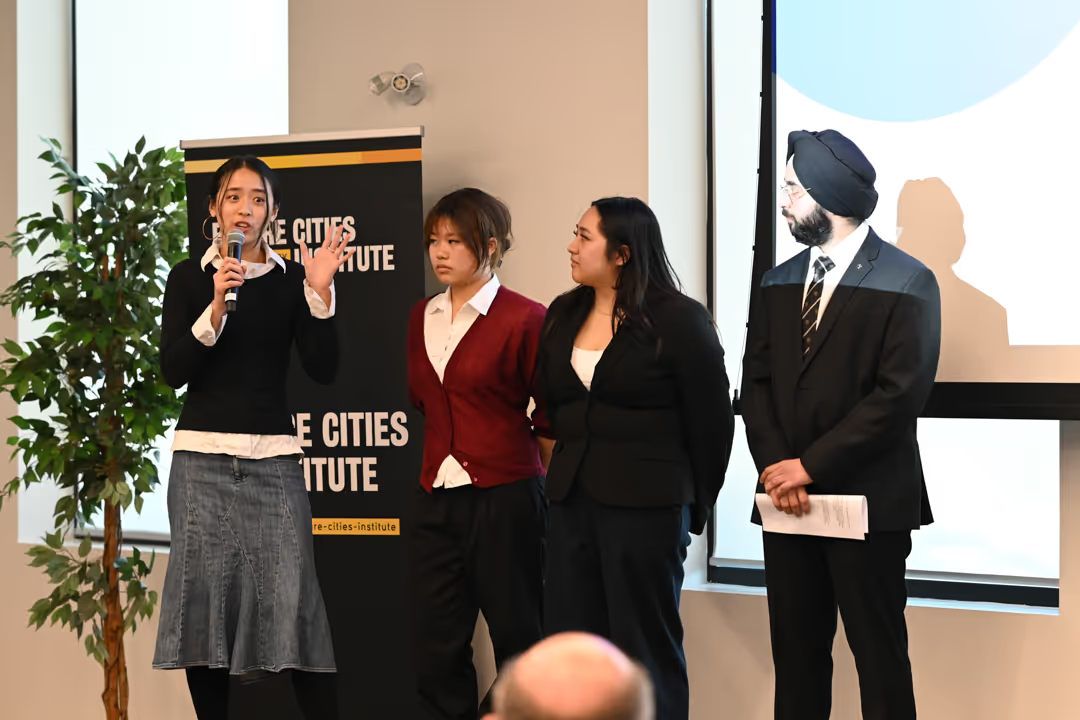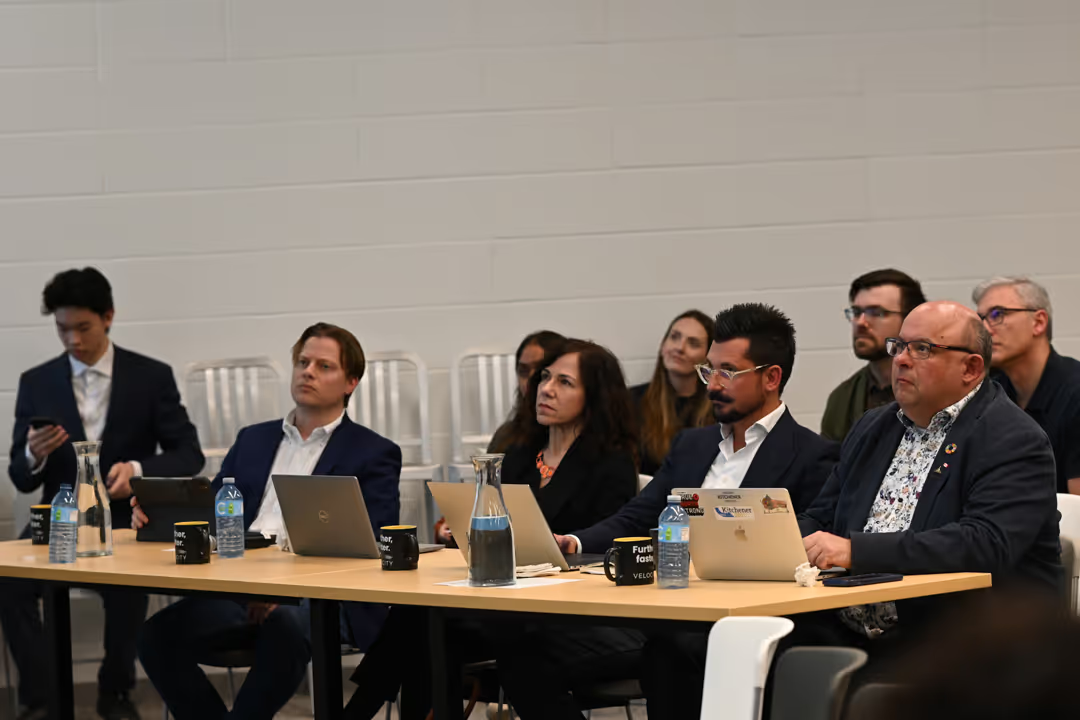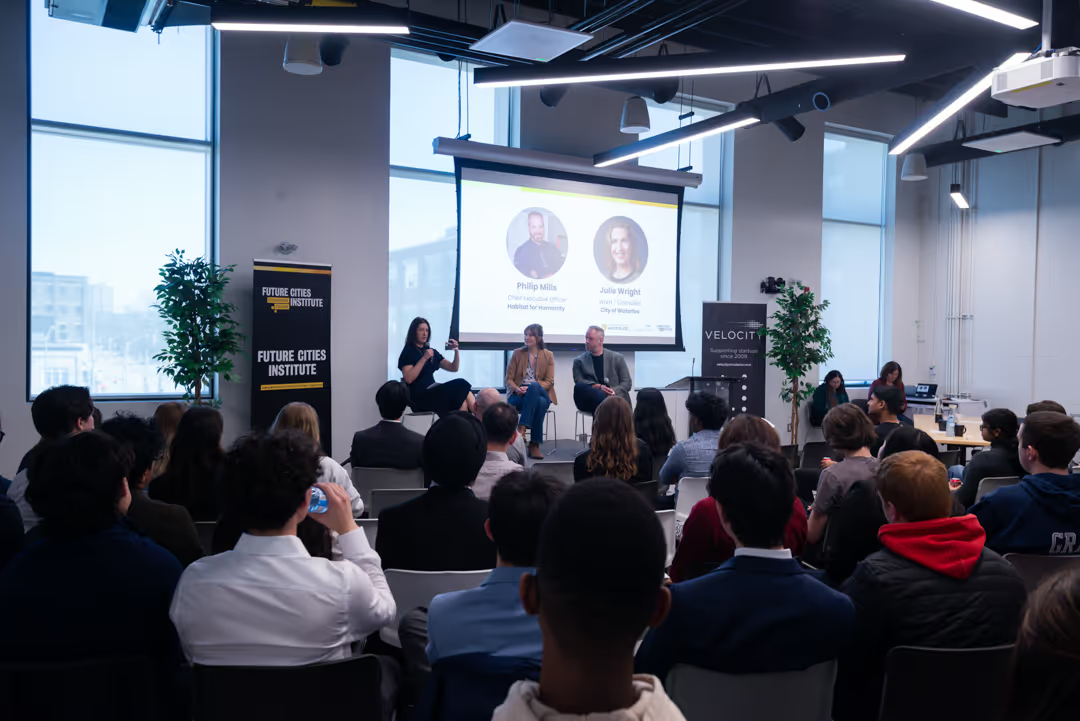Building the cities of tomorrow: 6 highlights from the Future Cities Innovation Challenge and iCapstone symposium

The inaugural Future Cities Innovation Challenge, co-hosted by Velocity and the Future Cities Institute, founded by CAIVAN (FCI), wasn’t just a student competition, it was a living embodiment of the University of Waterloo’s Global Futures vision.
As a campus-wide hub for urban innovation, the FCI infused Velocity’s Innovation Challenge with real-world context and a data-informed lens, asking students how they can build healthy, prosperous, and sustainable cities.
Students didn’t just imagine new ideas; they created practical, scalable solutions to the urgent challenges faced by cities today, from affordable housing and sustainable infrastructure to urban mobility and the ethical use of technology.

Here are six highlights from this ambitious and inspiring event:
1. A Challenge Rooted in Global Innovation
At its heart, the Future Cities Innovation Challenge captured a distinctly Waterloo approach: using interdisciplinary learning to shape a better future for people and the planet.
Students from all faculties, meeting for the first time, rapidly formed teams and launched into a two-week sprint focused on systems-thinking, collaborative problem-solving, and real-world innovation. Working in a collaborative environment that brought together diverse disciplines, perspectives, and passions, they demonstrated that tackling society’s biggest challenges requires not only technical skill but also creativity, empathy, and cross-sector collaboration.
“To make the most impact, we need to focus on the areas where we can leverage our strengths and differentiators.” – University of Waterloo, Global Futures
2. Four Real-World Problem Spaces, Five Interconnected Futures
Each student project addressed one or more of Waterloo’s five Global Futures, grounded in real municipal challenges across four problem areas:
Accelerating Housing Development (Sustainable & Economic Futures)
Harnessing AI for Smarter Urban Transformation (Technological & Societal Futures)
Building Sustainable Infrastructure (Sustainable & Economical Futures)
Advancing Sustainable Mobility (Health, Sustainable, Technological & Societal Futures)
“These interconnected futures help us focus and coordinate our work across disciplines and organizational boundaries.” – Global Futures
3. Mentorship and Insight at Every Turn
Throughout the challenge, students were supported by a dynamic group of mentors, advisors, and industry leaders, including experts from municipal government, startups, the FCI and academia.
“Innovating for healthier, stronger, and more resilient communities is crucial. By leveraging new technologies and collaborative approaches, we can build infrastructure that not only meets today's needs but also anticipates future challenges, ensuring prosperous growth and improved quality of life for all residents.” says Dr. Leia Minaker, Director of the Future Cities Institute
Connecting cities, industry leaders and entrepreneurs can accelerate the time it takes for a hypothetical idea to be a real-world application.
“Thank you to the judges and mentors for their support and motivation! -” – EVera Team

4. Ideas Taking Flight
After two weeks of ideation, prototyping, and refining their pitches, top teams were awarded funding to continue building their ventures.
Top Three Teams ($5,000 each):
Permitly – A digital solution to streamline and simplify the building permit process, accelerating access to affordable housing. Submitted by Leslie Jiayi Liu, School of Planning; Faculty of Environment; and Cynthia Zhang, Architecture, Faculty of Engineering.
Cascade Robotics – A robotic gantry system that automates material handling in modular home manufacturing, boosting speed, safety, and precision. Submitted by Nushaab Syed, Mechanical Engineering, Faculty of Engineering; Rehmeen Waqar, Architectural Engineering, Faculty of Engineering; and Leon Xu, Mechanical Engineering, Faculty of Engineering.
PoleWrapper – A specialized tool that repairs and protects utility poles from woodpecker damage and climate stress. Submitted by Nadine Oliynyk, Mechatronics Engineering, Faculty of Engineering; Christian Sforza Mechatronics Engineering, Faculty of Engineering; and Tyler West, Mechatronics Engineering, Faculty of Engineering;
People’s Choice Award ($2,500):
United Mobility – A micromobility platform born from a dinner conversation and fueled by startup funding to transform urban transportation. Submitted by Jonathan Gong (BCS ’24) ; Owen Kim, Biomedical Engineering, Faculty of Engineering; Nathan Li, Software Engineering, Faculty of Engineering and Faculty of Math; David Wu, Biomedical Engineering, Faculty of Engineering.

5. Thought Leadership That Shaped the Conversation
The challenge closed with a thought-provoking fireside chat which explored how students and cities can partner to shape equitable, sustainable, and inclusive futures echoing the challenge’s core themes and offering powerful calls to action for continued civic innovation.
Philip Mills, CEO, Habitat for Humanity Waterloo
Julie Wright, Ward 7 Councillor, City of Waterloo
Moderated by Leia Minaker, Director, Future Cities Institute
6. A Campus-Wide Collaboration with Lasting Impact
What makes Waterloo special is its culture of tenacity, collaboration, and a shared commitment to impact. From Velocity, the Future Cities Institute, and the broader University of Waterloo ecosystem, to our industry collaborators and community partners it was a connected network aligned with a mission to better our cities. "It's in the intersections where Waterloo’s tenacity for identifying new opportunities, solutions, and leading change will shine.” – Global Futures
The innovation challenge was just one example of what’s possible when ideas meet action. Through the i-Capstone program, both students and community partners can keep that momentum going, collaborating to tackle real-world challenges. Learn how to get involved here: https://uwaterloo.ca/future-cities-institute/talent-development/icapstone-future-cities